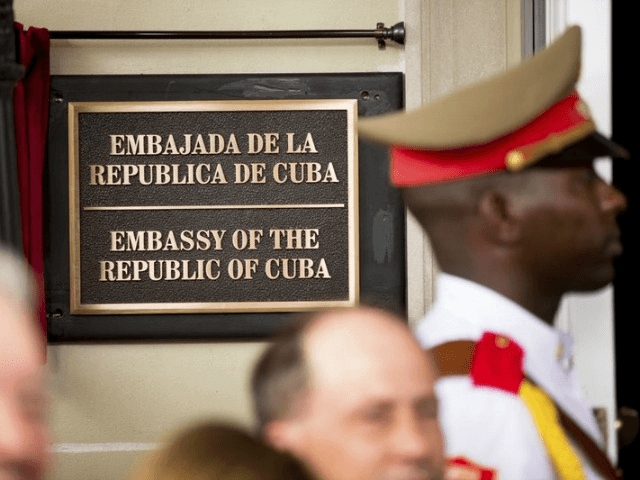The U.S. State Department confirmed Wednesday that several American diplomats left the U.S. embassy in Havana, Cuba, in May after complaining of “a variety of physical symptoms” triggered by unspecified “incidents.”
The Associated Press and CNN reported spokeswoman Heather Nauert’s comments at the agency’s daily press briefing that unnamed sources had confirmed the symptoms included “unexplained losses of hearing” and symptoms similar to those of concussions. The AP notes that their sources believe a “covert sonic device” triggered the symptoms, but there is no confirmation that the Cuban government possessed or used such a device.
The communist government in Cuba has denied any acts of physical hostility against American diplomats despite its long history of harassment and abuse of Americans on the island.
“Some U.S. government personnel who were working at our embassy in Havana, Cuba on official duty … reported some incidents which have caused a variety of physical symptoms,” spokeswoman Nauert told reporters Wednesday. “We asked two officials who were accredited in the embassy of Cuba in the United States to depart the United States.”
Nauert confirmed that the Cubans left Washington on May 23. She added a reminder that “the Cuban government has a responsibility and obligation to protect our diplomats.”
Nauert refused, however, to expand upon what sorts of “symptoms” the “incidents” caused, what the “incidents” were, or who or how many people were involved. She also did not note whether the expulsion of Cuban diplomats from Washington was a move to balance the number of diplomats in each country or whether those expelled were involved in the “incidents.” The diplomats were not declared persona non grata, permitting them to return to the United States at a later date.
On Wednesday evening, the Associated Press reported that the individuals who left the American embassy in Havana did so “with severe hearing loss attributed to a covert sonic device.” The report estimated that “about five” diplomats and spouses were affected and that American investigators had not yet concluded whether “the device was a weapon used in a deliberate attack, or had some other purpose.”
What investigators appear to have confirmed, according to the AP, is that “the diplomats had been exposed to an advanced device that operated outside the range of audible sound and had been deployed either inside or outside their residences.”
A subsequent report from CNN compared the symptoms aside from the hearing loss as resembling those of a concussion, suggesting that the sonic devices can damage a brain in a way similar to a physical blow. CNN quotes an unnamed official who stated, “We have worked with the Cubans to try and find out what is going on. They insist they don’t know, but it has been very worrying and troublesome.”
President Barack Obama reopened the U.S. embassy in Havana in 2015 following the announcement of a new, pro-Castro American policy that would allow American businesses to further enrich the Castro regime while accepting Raúl Castro’s repeated demands that “nothing” would be expected from the regime in return, in particular, respect for international human rights norms.
The Cuban Foreign Relations Ministry (MINREX) responded to the incident in a statement published in Granma, the official newspaper of the Communist Party of Cuba (PCC).
“Cuba addressed this matter with utmost seriousness and has acted with promptness and professionalim to clarify the situation,” the statement read, “initiating an exhaustive, prioritized, and urgent investigation at the highest levels of the Cuban government.”
The statement also complains about the expulsion of the Cuban diplomats, saying, “On May 23, the Department of State informed the Cuban embassy in Washington of the decision that two Cuban diplomats abandon the territory of the United States, which motivated a protest by the Foreign Relations Ministry against this unjustified and unfounded decision.”
The objection to removing the Cuban agents suggests that American officials did not merely want to reduce the number of staff in the embassy to balance the numbers following the departure of American officials from Havana.
The incident is the first to occur since Obama officially reopened the embassy, but far from the only case of suspected harassment of American diplomats in Cuba. Before it became an official embassy again, the U.S. embassy building in Havana still hosted some American diplomats, who were reportedly treated to routine harassment by passersby and Cuban government agents alike.
In 2012, the Miami Herald quoted a U.S. State Department official who said American diplomats on the island were treated regularly to “harassment and contempt” including Cuban government agents “shouting insults at them from their cars, publishing photos of their vehicles,” and harassing diplomats’ children.
“We have reminded the Cuban government on various occasions that, under the Vienna Convention, this type of treatment of diplomatic personnel is unacceptable,” the State Department official said at the time.
The Cuban government temporarily halted such treatment of Americans in March 2016, when then-president Obama embarked on his “historic” visit to watch a baseball game with Raúl Castro on the island. While the Cubans refrained from insulting Obama in person, state media referred to Obama as a “negro” who came to Cuba to “incite rebellion and disorder” shortly after his visit. By January 2017, Cuban soldiers were performing military exercises chanting slogans about putting “lead” in Obama’s head and body.
President Donald Trump has vowed to reverse Obama’s Cuba policies, adopting strategies to ensure that American tourist money does not enrich the regime. Trump has made no moves to shut the Cuban embassy down, however, and Nauert did not make any remarks regarding an end to the dangerous diplomatic project begun under Obama in her press conference Wednesday.

COMMENTS
Please let us know if you're having issues with commenting.